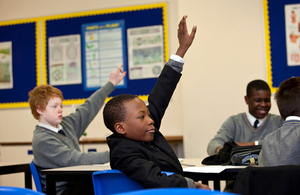Primary test results: standards rising in all subjects
Eighty thousand more children than 5 years ago will start secondary school secure in reading, writing and arithmetic.

pupils in classroom
School Reform Minister Nick Gibb today congratulated pupils and teachers after improved results in tests taken by 11-year-olds in reading, writing and maths.
The figures show that for this year’s key stage tests (taken in May by 550,000 children in their final year of primary school):
- 4 out of 5 11-year-olds (79%) achieved at least the expected level (level 4) in reading, writing and arithmetic (3Rs) - up from 3 out of 4 (75%) last year, and just 6 in 10 (62%) in 2009
- almost a quarter (24%) exceeded the expected level in the 3Rs - up from a fifth (21%) last year, and from just 1 in 8 (13%) in 2009
Comparisons with 2010, in terms of numbers, are not possible because a quarter of primary schools did not administer the tests that year.
It means that:
- 81,000 more children than in 2009 are meeting the expected standard in the 3 Rs (440,000 this year compared to 359,000 in 2009)
- 59,000 more children than in 2009 are exceeding the expected standard in the 3 Rs (134,000 this year compared to 75,000 in 2009)
This is against a backdrop of higher aspirations that all children achieve their potential, including:
- a new test in spelling, punctuation and grammar (introduced last year)
- the banning of calculators from maths tests (for the first time this year)
- higher floor standards (up to 65% this year)
And there were improvements in each of the individual subjects:
- reading - 9 out of 10 children (89%) reached at least level 4 (up 3 percentage points from last year) and half exceeded that (up 5 percentage points)
- spelling, punctuation and grammar - three-quarters (76%) reached at least level 4 (up 3 percentage points from last year) and more than half (52%) exceeded that (up 5 percentage points)
- maths - almost 9 out of 10 (86%) reached at least level 4 (up 1 percentage point from last year) and 4 in 10 exceeded that (up 1 percentage point)
- writing (teacher-assessed) - almost 9 out of 10 (85%) reached at least level 4 (up 2 percentage points from last year) and two-thirds exceeded that (up 3 percentage points)
School Reform Minister Nick Gibb said:
80,000 more children than 5 years ago will start secondary school this year secure in the basics - and able to move on to more complex subjects. It means in the long term these children stand a far better chance of winning a place at university, gaining an apprenticeship and securing good jobs.
We have set unashamedly high expectations for all children, introduced a new test in the basics of punctuation, spelling and grammar, and removed calculators from maths tests.
Today’s results show teachers and pupils have responded well to the higher standards our education reforms have demanded. Our education system is beginning to show the first fruits of our plan for education, helping to prepare young people for life in modern Britain. There is more to do but teachers and pupils deserve huge credit for such outstanding results.
Good results in key stage 2 tests lay the foundations for better GCSE results:
- latest figures (for 2013) showed that 57% of pupils who achieved at least level 4 at aged 11 in English and maths went on to achieve at least 5 or more GCSEs at C or better including English and maths.
Percentage of pupils reaching level 4 or above
| Subject | 2009 | 2010 | 2011 | 2012 | 2013 | 2014 |
|---|---|---|---|---|---|---|
| Reading | 86 | 83 | 84 | 87 | 86 | 89 |
| Maths | 79 | 79 | 80 | 84 | 85 | 86 |
| Spelling, punctuation and grammar | n/a | n/a | n/a | n/a | 74 | 76 |
| Writing | n/a | n/a | n/a | 81 | 83 | 85 |
| 3Rs | 62 | 64 | 67 | 75 | 75 | 79 |
Note: From 2012, writing teacher assessment replaced writing tests. The spelling, punctuation and grammar test was introduced in 2013.
Notes to editors
- The tests were taken by 557,400 year 6 pupils in May this year.
- The full results: ‘National curriculum assessments at key stage 2 in England: 2014’.
- Changes to the administrative process of marking tests may happen from year to year and care should be taken when comparing results between years. Readers’ attention is drawn to guidance within the SFR on the impact of changes when comparing this year’s results with other years.
- Information about the KS2 floor standards: ‘Package of primary school measures will raise ambition - and standards’
DfE media enquiries
Central newsdesk - for journalists 020 7783 8300